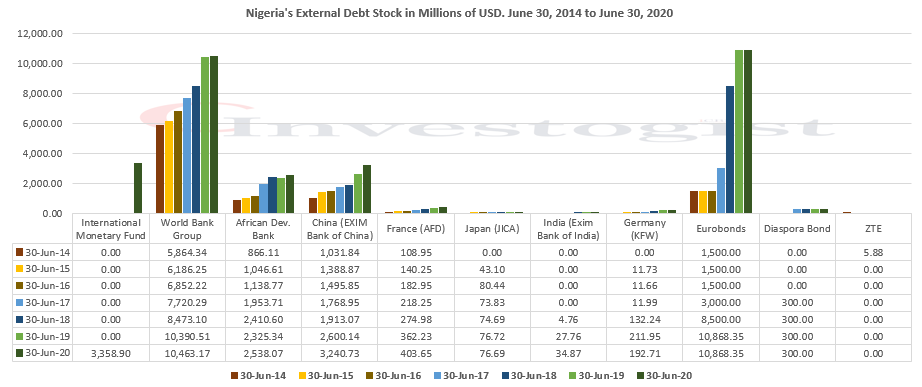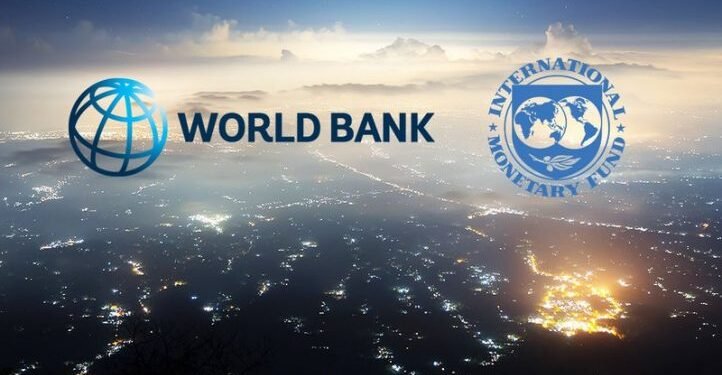So much has been said and written about Nigeria’s foreign (external) debt, most especially the one gotten from China (EXIM Bank of China). On Thursday, Investogist reported the N2.4 trillion rise in Nigeria’s debt in just the second quarter of 2020 (April to June) alone, which was according to the recent data release by the Debt Management Office.
- Read also; Just in: Nigeria’s debt rises by N2.4 trillion in 3 months to hit N31 trillion
- Buhari directs CBN to stop forex for food items, fertilizer importation
A review of the data for external debt shows that China is not Nigeria’s biggest creditor, but is the fourth biggest. From the biggest to the lowest, below are the current foreign creditors of the country;
- Eurobonds Holders: 35%
- World Bank Group: 33%
- International Monetary Fund: 11%
- China (Exim Bank of China): 10%
- Diaspora Bond Holders: 1%
- France (AFD): 1%
- Germany (KFW): 1 %
- Japan (JICA): Negligible %
- India (Exim Bank of India) Negligible %
We analyzed Nigeria’s external debt stock for the past 6 years; from June 30 2014 to June 30 2020, and found that the Government of Nigeria has been increasing the total amount borrowed from its major creditors over the years.
Our analysis revealed that the external debt has grown from $9.377 billion as at June 30, 2014 to $31.477 billion as at June 30, 2020. This represents a 236% ($22.100 billion) jump in the external debt stock.
The increase in debt from the major creditors over this 6 year period are;
- Eurobonds debt stock increased by 625%
- France (AFD) debt stock increased by 270%
- China (Exim Bank of China) debt stock increased by 214%
- African Development Bank debt stock increased by 193%
- World Bank Group debt stock increased by 78%
The International Monetary Fund loaned money to the country for the first time in 2020, and yet holds 11% of the external debt stock as at June 30, 2020.
The bar chart below shows the debt stock from each of the creditors over the 6 years in review.
 ABOUT THE MAJOR LENDERS
ABOUT THE MAJOR LENDERS
International Monetary Fund (IMF): The International Monetary Fund (IMF) is an organization of 189 countries, working to foster global monetary cooperation, secure financial stability, facilitate international trade, promote high employment and sustainable economic growth, and reduce poverty around the world.
Created in 1945, the IMF is governed by and accountable to the 189 countries that make up its near-global membership.
The IMF’s primary purpose is to ensure the stability of the international monetary system—the system of exchange rates and international payments that enables countries (and their citizens) to transact with each other. The Fund’s mandate was updated in 2012 to include all macroeconomic and financial sector issues that bear on global stability.
The World Bank Group: The World Bank is an international financial institution that provides loans and grants to the governments of poorer countries for the purpose of pursuing capital projects. It comprises two institutions: the International Bank for Reconstruction and Development (IBRD), and the International Development Association (IDA).
The World Bank was created at the 1944 Bretton Woods Conference, along with the International Monetary Fund (IMF). The president of the World Bank is, traditionally, an American. The World Bank and the IMF are both based in Washington, D.C., and work closely with each other.
China (Exim Bank of China): The Export-Import Bank of China is a state-funded and state-owned policy bank with the status of an independent legal entity. It is a bank directly under the leadership of the State Council and dedicated to supporting China’s foreign trade, investment and international economic cooperation.
With the Chinese government’s credit support, the Bank plays a crucial role in promoting steady economic growth and structural adjustment, supporting foreign trade, and implementing the “going global” strategy.
African Development Bank: The African Development Bank Group (AfDB or ADB) or Banque Africaine de Développement (BAD) is a multilateral development finance institution. The AfDB was founded in 1964 and comprises three entities:
The African Development Bank, the African Development Fund and the Nigeria Trust Fund. The AfDB’s mission is to fight poverty and improve living conditions on the continent through promoting the investment of public and private capital in projects and programs that are likely to contribute to the economic and social development of the region. The AfDB is a financial provider to African governments and private companies investing in the regional member countries (RMC).
Eurobonds: A Eurobond is a debt instrument that’s denominated in a currency other than the home currency of the country or market in which it is issued.
Issuance of Eurobonds is usually handled by an international syndicate of financial institutions on behalf of the borrower, one of which may underwrite the bond, thus guaranteeing the purchase of the entire issue.
Written by;
Nnamdi M.

























































